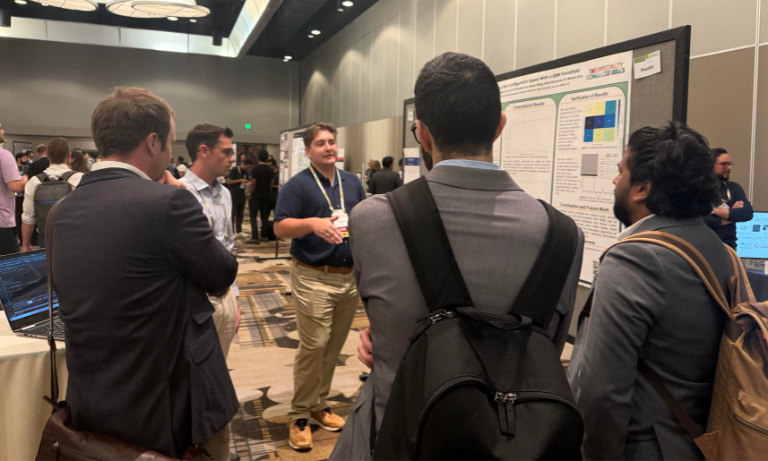1961 electronic engineering alumnus Jim Rodgers credits Cal Poly education and a love of innovation for business success
A highly-successful engineer, inventor and businessman, 1961 electronic engineering alumnus James (Jim) L. Rodgers remains a strong proponent of the polytechnic education he received in San Luis Obispo.
“My years at Cal Poly has remained a cornerstone in my life,” Rodgers said on a recent trip to campus from his home in Fresno, Calif. “The Cal Poly administration, faculty and my fellow students gave me a very positive and strong foundation that has served me well throughout my career.”
In addition to his Cal Poly education, Rodgers, who holds dozens of U.S. patents involving analog-to-digital converters and digitizing systems for cordless pens and tablet computers, also credits a love of “motivation through invention” for his success.
“We lived the ‘Learn by Doing’ method every day and were allowed to experiment and learn from mistakes, and I was really attracted to that,” said Rodgers, who also earned a business degree from UCLA and went on to start several electronics companies, including Talos Systems and computer peripheral equipment maker Kurta Corp.
Rodgers, who has been retired since 2003, spoke to Cal Poly Engineering in early April after touring the now Electrical Engineering Department.

Where did you grow up and how did you end up attending Cal Poly?
I lived with my family in Monrovia, California and went to Monrovia High School. We had fallen on hard times and were receiving government assistance. But fortunately, we lived within walking distance of an electronics school named Solar Electronic. The school specialized in teaching basic circuitry to veterans. My mother signed up for some classes and was later able to get a full-time job teaching at the school. She also saw a career opportunity for me in electronics and encouraged me to attend her classes after school. I learned quickly, and before long, I was helping her teach her students.
After graduating high school, my mom encouraged me to enroll at Cal Poly because it had an excellent Electronic Engineering program. I got a part-time job, took out a loan and was a very proud college student.
Where did you go after graduating from Cal Poly?
I took some time looking into the electronic industry. I learned computer electronics was going to change the world. It was then I realized I had enough electronic knowledge to create and build electronic products. All I needed was a good idea and my own company. However, I didn’t have nearly enough business knowledge. So, I decided to go back to college and get an MBA at UCLA. My time at Cal Poly had given me the confidence to do it.
While I was researching the type of business knowledge I needed, I discovered UCLA had an accelerated business program that allowed students to get a four-year MBA in two years! I immediately applied and was accepted. I knew that with degrees from Cal Poly and UCLA, I was on my way to a career in electronics.
I started networking and discovered a summer job opportunity working in electronics in the Military Division of the Motorola Corporation in Phoenix, Ariz. I got the job! After graduating from UCLA, Motorola eventually offered me a full-time job. It was a great opportunity to learn more about advanced electronics plus manufacturing and business operations.
Describe the inspiration of your first invention?
I had been thinking about several electronic ideas and had one that I felt was good enough to be my first invention I could design, engineer, manufacture and sell. At that time, electronic devices attached to a mechanical device functioned in analog and not digital. But computers were the opposite. They functioned in digital not analog. For a computer to control a mechanical device, this was a serious problem that needed to be solved. The solution was a converter that could convert analog to digital and digital back into analog. I had found my first electronic invention!
Any words for current or prospective Cal Poly engineers?
If you are now, or are thinking about becoming, a Cal Poly student and you are motivated by invention like I was, may your passions be realized, and may you have many fond memories of your time at Cal Poly.


